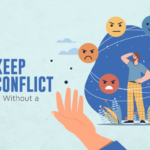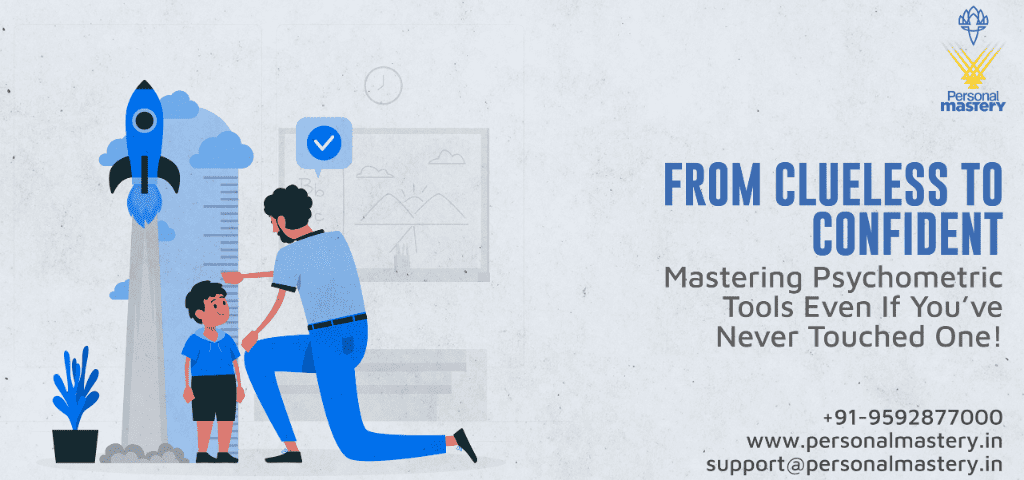
Why You Keep Avoiding Conflict And How to Face It Without a Fight
July 8, 2025
When You Always Say Yes but Wish You’d Said No: How NLP Helps You Build Strong Boundaries Without Guilt
July 15, 2025Have you ever found yourself sitting across from someone, trying to assess their skills, motivations, or personality… and secretly wished you had a crystal ball? Or maybe, you stared at a psychometric report like it was a secret language only aliens or HR veterans could understand?
If that made you chuckle (or cringe), you’re in the right place.
Let’s be real—limited experience with psychometric tools for assessments is more common than most people admit. Whether you’re an aspiring coach, HR professional, trainer, psychologist, or just someone curious about human behavior, those complex charts, personality models, and technical jargon can feel like an unsolvable puzzle. But here’s the kicker — you don’t need years of experience to start using psychometric assessments effectively. You just need the right mindset, the right guide (hey there! ), and a sprinkle of enthusiasm.
So grab your favorite coffee (or chai), and let’s demystify the world of psychometric testing together.
You're in a job interview panel. The candidate across from you seems perfect—on paper. You ask the right questions, but you still can’t shake off the gut feeling that something’s...off. Or maybe you’re onboarding a new team member and wondering if their personality will gel with the team dynamics.
You think to yourself:
"If only there were a tool that could help me predict behavior, attitude, motivation, and skill compatibility!"
And just like that—psychometric tools pop into your brain. But then a louder voice says:
"Wait... I don’t really know how to use those. That stuff is for psychologists, right?"
Wrong.
What Are Psychometric Tools (In Normal Human Terms)?
Psychometric tools are like x-ray glasses for the mind — they help reveal what resumes and small talk hide. They measure a person’s personality traits, emotional intelligence, motivations, aptitudes, and behaviors.
These tools aren’t only for clinical psychologists. HR professionals, life coaches, leaders, and career counselors worldwide now use them to make informed decisions.
Whether it’s a DISC profile, MBTI, Big Five, or Emotional Intelligence tests, they all fall under the umbrella of psychometric assessments.
And here’s the beautiful part: you don’t need to be a scientist to use them effectively. You just need to start somewhere.
But What If I Have Zero Experience?
Welcome to the club! Most people start their journey with limited experience with psychometric tools for assessments, and many become experts faster than they ever imagined.
The good news is:
- You don’t need to memorize Freud’s theories.
- You don’t need to ace a psychology degree.
- You just need curiosity, a basic understanding, and the will to grow.
Why Should You Bother?
Let’s break it down.
- Better Hiring Decisions
Using psychometric tools for hiring reduces guesswork. You can spot red flags or green flags with far more accuracy than gut instinct alone. - Stronger Team Dynamics
Imagine knowing in advance who loves structure, who thrives in chaos, and who secretly hates group meetings. Sounds like a manager’s dream, right? - More Impactful Coaching
If you’re a coach or trainer, understanding your client’s core behaviors and motivations gives you a superpower. You stop shooting in the dark and start hitting targets. - Personal Growth
Yes, even you can benefit. Take a few tests yourself. You might uncover patterns that explain your biggest wins (and even those Monday meltdowns).
Where to Begin? (Without Overwhelm)
Let’s simplify your path to mastering psychometric assessment skills:
1. Start with Free Tools
There are beginner-friendly tests like:
- 16Personalities (based on MBTI)
- VIA Strengths Assessment
- DISC personality tests
These give you a taste of how psychometric evaluation techniques work without drowning you in data.
2. Take a Short Online Course
Search for a psychometric assessment certification course that focuses on real-world applications, not just theory. In just a few weeks, you can start speaking “psychometric” with confidence.
3. Practice What You Learn
Use the tools with friends or colleagues. Practice interpreting results. Discuss. Debate. Laugh at your own results. (Yes, I discovered I’m a “turbulent introvert” with a strong need to be liked. Go figure. )
4. Keep It Simple
You don’t need to use every tool under the sun. Pick one or two, go deep, and slowly build up your psychometric test proficiency.
The Secret Sauce? Confidence.
Most people don’t struggle with how to use psychometric tools — they struggle with believing they can. So if you’re standing at the edge of the learning curve, just remember: everyone starts from scratch.
Even seasoned HR folks once Googled, “How to interpret a DISC graph?”
(Even I still do sometimes when my brain's on vacation.)
With just a bit of learning, you'll be decoding personalities like a pro. You’ll ask better questions. Make sharper decisions. Build stronger connections.
The Beginner Advantage
Having limited experience with psychometric tools is actually your superpower. Why?
Because you’re:
- Not stuck in old habits.
- Open to new learning.
- Likely to use tools with humility and curiosity (which matters A LOT when interpreting human behavior).
You bring fresh eyes, and that makes you valuable.
Let's Get Real
Sure, psychometric assessments sound fancy. But at the heart of it, they're just tools that help you understand people (including yourself) a little better.
So if you’ve been avoiding them because they felt too technical or “not your thing,” I’m here to say: you got this.
No more second-guessing your choices. No more relying solely on your gut.
It’s time to combine your intuition with insight.
Final Word (And a Quick Pep Talk )
If you’ve made it this far, I already know one thing — you care. You care about understanding people. You care about doing your job better. You care about growth.
And that’s all you need to become great with psychometric assessments.
So go ahead, explore this fascinating world. Learn it. Play with it. And most importantly—use it.
Because the person who learns how to read the mind (ethically!)… becomes unforgettable in any field.
Quote to Leave You Inspired:
"The greatest weapon against stress is our ability to choose one thought over another."
— William James (The Father of Psychology)
Contact Us
Phone: +91-9592877000
Email Id: support@personalmastery.in
Address: #748, Sector 9, Panchkula (Chandigarh), Haryana (INDIA) – 134113


